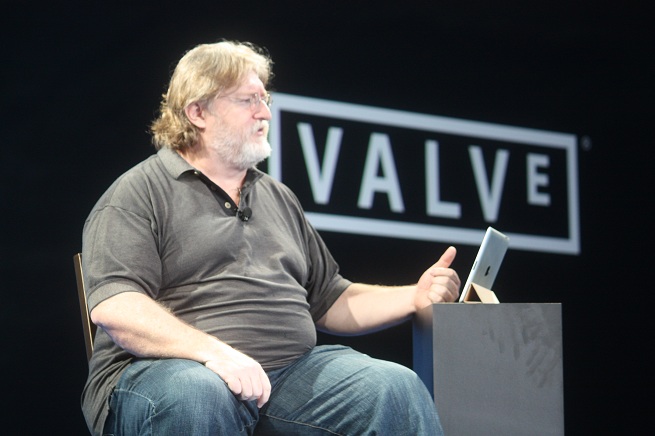Valve cofounder Gabe Newell said in a speech that he believes that the PC is poised to expand into the rest of the living room. He thinks that the constant flux of the game industry favors the PC, which is able to absorb technological change better than the traditional video game consoles.
[aditude-amp id="flyingcarpet" targeting='{"env":"staging","page_type":"article","post_id":618572,"post_type":"story","post_chan":"none","tags":null,"ai":false,"category":"none","all_categories":"games,","session":"C"}']Newell is a popular leader in games today, as Valve is the maker of Half-Life, Portal and Portal 2, Left 4 Dead, Counter-Strike, and others — all highly regarded and notable games. Valve also runs the Steam digital game distribution and community service on the PC, and it is considering entering the living room console market with the so-called Steam Box, an open Linux-based machine.
Yesterday, he appeared at the 12th annual DICE Summit, an elite game industry event in Las Vegas, with film director J.J. Abrams. At the end of their chat, they said they were working together on games. Today, Newell took the stage solo to explain the way Valve’s thinking has evolved. He said he wants the open, indie gaming world to thrive.
“If you look back the PC has been the center of innovation,” he said. “It has come out of open competition,” Newell said.
The PC has its weaknesses, like how its input system isn’t the best compared to game consoles. But the marginal cost of adding capabilities to a PC so it can function in the living room is less than putting a brand-new box in the living room. But Newell didn’t comment on Microsoft’s role in guiding the PC, as his company has clashed with Microsoft on how much of a gatekeeper the giant tech company should be for new PC software.
Newell wants the PC to have its own app store with an endless amount of user-generated content as well as professional content, all available for users to try out. Consumers already have a lot of content available for the PC and huge investments in PC-based social activities, too. That’s an investment that they should have to throw away.
He said that the PC is able to absorb new technologies, like in-home streaming and extra monitors. The price-performance of PCs also makes them ideal as hardware.
“There has been a massive capital investment in the PC in the last few years,” he said.
But he warned that Apple is a threat to the PC. If it makes a television or extends the iOS into the living room, it has enough momentum on its side with consumers to push the PC aside.
[aditude-amp id="medium1" targeting='{"env":"staging","page_type":"article","post_id":618572,"post_type":"story","post_chan":"none","tags":null,"ai":false,"category":"none","all_categories":"games,","session":"C"}']
“It’s scarier what Apple will do,” he said.
Newell thinks that free-to-play games will be a boon for the PC. With it, users play for free and then pay real money for virtual goods. When a game goes free-to-play, Newell said that the audience increases 10-fold and revenues increase three-fold.
But Newell doesn’t like every new technology that can enhance the PC. Cloud gaming, for instance, puts the “latency compensation” in the wrong spot of the network. It should be out on the edge, not in the middle of an network.
“You have a network cost,” he said. “Cloud gaming falls over from its own success.”
[aditude-amp id="medium2" targeting='{"env":"staging","page_type":"article","post_id":618572,"post_type":"story","post_chan":"none","tags":null,"ai":false,"category":"none","all_categories":"games,","session":"C"}']
Translation: The network becomes more expensive if cloud gaming succeeds and adds a flood of traffic to it. That will cause network pricing to go through the roof.
Newell also foresees a sea change in what games are. He thinks they will become goods and services that are all part of a connected ecosystem. He said he likes the idea of games as a service, where Valve fixes problems and responds to customers when they give feedback on a game. He also believes that users can make much better contributions for enhancing games than Valve itself can. Those people should be able to make money from their contributions to modifying games.
“We have people making $500,000 selling goods in a game,” Newell said. “Games are part of digital economies. In the past, people spend huge amounts of time in games. They move on to the next game, and all that is thrown away. It’s like moving out of your house and burning it down” rather than taking things with you.
As much as Newell supports the PC, he doesn’t necessarily trust Microsoft. He’s been critical of Windows 8 and its closed platform. Valve is reportedly working on a Steam Box PC-like console for the living room. One reason would be to provide an alternative to a Microsoft PC. Newell said he supports Linux as an alternative, to get around gatekeepers.
[aditude-amp id="medium3" targeting='{"env":"staging","page_type":"article","post_id":618572,"post_type":"story","post_chan":"none","tags":null,"ai":false,"category":"none","all_categories":"games,","session":"C"}']
“Make sure we have the freedom to innovate and pursue opportunities,” he said. “Linux is a get-out-of-jail free card for our industry if we need it.”
Valve is working on input hardware, which is a hole in the market now.
“We don’t want to ship hardware,” he said. “Our goal is to move things forward on the PC.” The question is how to segment things properly.
Valve is working on console-like PCs with partners, emphasizing the price performance and opennesss of the PC. What it must work out is how to share revenue among all of the partners, Newell said.
[aditude-amp id="medium4" targeting='{"env":"staging","page_type":"article","post_id":618572,"post_type":"story","post_chan":"none","tags":null,"ai":false,"category":"none","all_categories":"games,","session":"C"}']
Newell said stores should really have user-generated content. “It’s all about enabling engagement,” he said. “Same is true for a store.” Others can create versions of stores that sit on the front-end.
“If we are wrong, at least it will be spectacularly entertaining as a failure,” Newell said.

